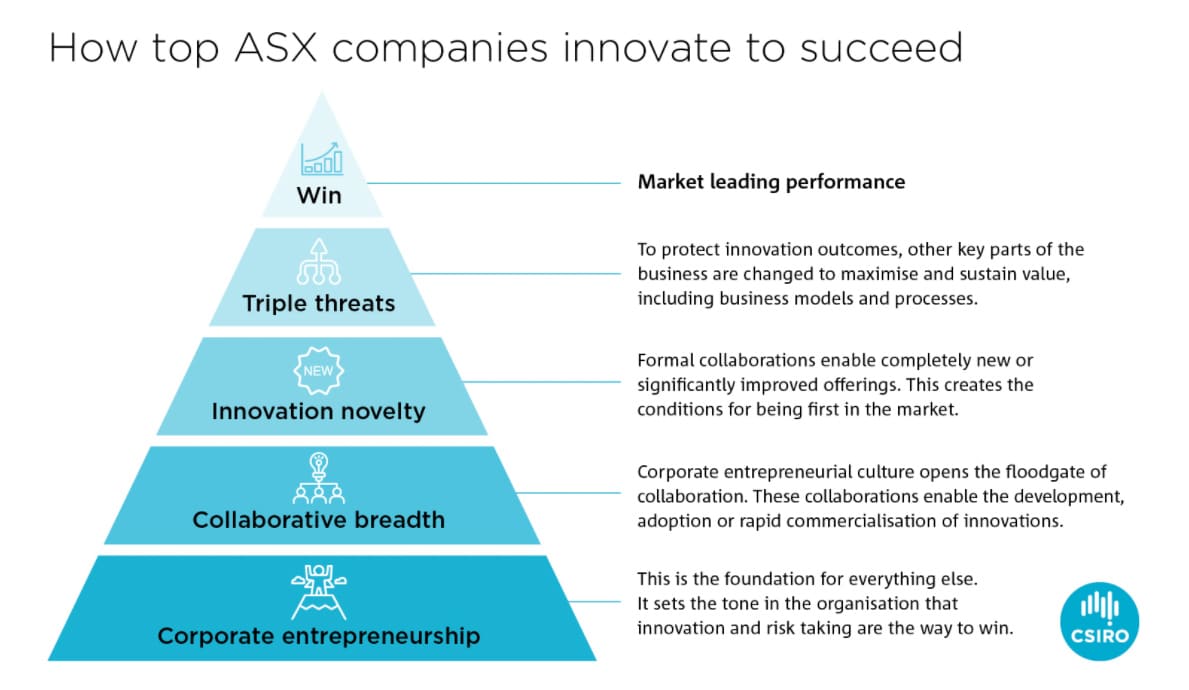A report has been released by Australia’s national science agency, CSIRO, which reveals a strong link between bold risk taking and financial success for top performing Australian Securities Exchange-listed companies.
The findings, based on a detailed survey which gathered innovation data from executives and senior leaders in ASX-listed companies, can help businesses navigate the uncertainty caused by the economic impacts from COVID-19 – and plan for this new normal, using evidence-based insights.
Thriving through innovation: Lessons from the top, was produced by CSIRO in partnership with The University of Queensland.
Using advanced statistical approaches, the report linked their responses to real-world financial performance, revealing four factors that drive success:
- Corporate entrepreneurship– The most important factor, comprising risk taking behaviour, innovative thinking and proactiveness to be bold for innovation-driven growth.
- Innovation novelty– Being first in the market with innovations that are new to the world or to Australia.
- Collaborative breadth– Co-creating innovations with a range of collaborators including customers and research agencies.
- Triple threats– Making changes to products, processes and business models simultaneously to fully unlock and protect value from innovation investments.
Focusing on these key factors can help companies launch successful new products, enter new markets, and create new industries.
CSIRO Chief Executive Dr Larry Marshall said innovative businesses were essential to Australia’s recovery from COVID-19.
“When science solves a seemingly impossible problem, it can create a whole new market that didn’t exist before and that grows the pie bigger for everyone,” Dr Marshall said.
“Collaboration on science-driven innovation drives real economic growth, new jobs, and will grow us out of the COVID recession.”

CSL Chief Scientific Officer Dr Andrew Nash said rapid advances in science and medicine made constant innovation a critical business practice for biotechnology companies.
“In our business, if you’re not innovating, you’re managing your exit,” Dr Nash said.
“The role that science is playing in the battle against COVID-19 has demonstrated the importance of being able to respond quickly, to re-purpose infrastructure and bring together collaborations in a way that addresses new challenges through novel solutions.
“We’ve been extremely heartened by the spirit of collaboration and openness that the pandemic has precipitated across industry and academia.
“Echoing the findings of this report, we hope these developments serve as a blueprint for future endeavours.”
Partner at Main Sequence Ventures, which manages the CSIRO Innovation Fund, Phil Morle, said the time was right for Australian companies to embrace innovation.
“The most innovative companies in the world have emerged from a creative, courageous surge that comes from times of struggle,” Mr Morle said.
“Our world now has many problems to solve.
“These problems lead to opportunities.
“It is a potent moment for business leaders to unlock entrepreneurial talent in their organisations, begin some unusual collaborations and watch the unexpected new sprouts of growth emerge.”
Associate Professor Tim Kastelle, director of Entrepreneurship & Innovation at The University of Queensland Business School said of the report: “Every CEO, senior leader, and Board Member will say that they want their organisation to be innovative,” Professor Kastelle said.
“But most are unwilling to actually change the way their organisations think and act. And without changing behaviour, there’s no change in outcomes.
“This report does a terrific job of not just laying out why building an innovation capacity is so important, but also in illustrating how to go about changing the mindsets and behaviours that enable innovation.”
CSIRO works with small and large business across the various stages of the innovation lifecycle.







